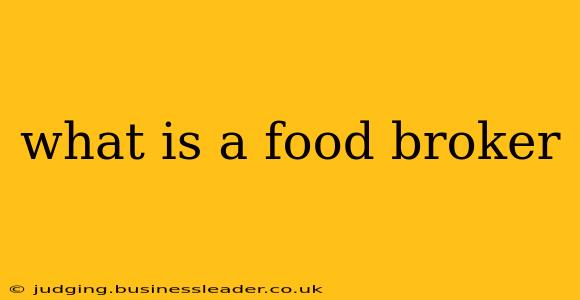The food industry is a complex network, connecting farmers, manufacturers, and consumers. At the heart of this network, often acting as the crucial link, are food brokers. But what exactly is a food broker? Simply put, a food broker acts as a sales representative for food manufacturers, connecting them with buyers like restaurants, grocery stores, and distributors. They don't own the food products they sell; instead, they facilitate the sales process, earning a commission on each successful transaction. Think of them as matchmakers in the culinary world.
This seemingly simple description belies a vital role in the food supply chain. Let's delve deeper into their responsibilities and the nuances of their profession.
What Does a Food Broker Do?
Food brokers wear many hats. Their primary responsibility is to generate sales for their food manufacturer clients. This involves a multifaceted approach:
- Identifying potential buyers: Brokers have extensive networks of contacts within the food industry. They use this network to identify potential buyers who might be interested in their clients' products.
- Negotiating contracts: Once a potential buyer is identified, the broker negotiates the terms of the sale, including price, quantity, delivery, and payment terms.
- Managing relationships: Building and maintaining strong relationships with both manufacturers and buyers is crucial for a food broker's success. This involves regular communication, understanding market trends, and addressing any issues that arise.
- Market research and analysis: Food brokers are often well-versed in market trends and consumer preferences. They use this knowledge to advise their clients on product development and pricing strategies.
- Providing sales support: Beyond securing initial deals, brokers often provide ongoing support, assisting with marketing and promotional activities.
How Do Food Brokers Get Paid?
Food brokers are typically compensated through commissions based on the sales they generate. The commission rate varies depending on the product, the volume of sales, and the specific agreement between the broker and the manufacturer. It's a performance-based system, rewarding brokers for their effectiveness in generating revenue for their clients.
What are the Benefits of Using a Food Broker?
For food manufacturers, particularly smaller ones, using a food broker offers significant advantages:
- Expanded market reach: Brokers have established relationships with buyers across diverse geographical areas and market segments.
- Reduced sales costs: Utilizing a broker often proves more cost-effective than building an in-house sales team, especially for companies with limited resources.
- Access to market expertise: Brokers provide valuable insights into market trends, consumer preferences, and competitive landscapes.
- Focus on production: By outsourcing sales, manufacturers can focus their energy and resources on production, product development, and quality control.
What is the Difference Between a Food Broker and a Food Distributor?
This is a common point of confusion. While both operate within the food industry, their roles differ significantly:
- Food brokers: Act as sales representatives, connecting manufacturers with buyers but do not own or handle the products.
- Food distributors: Purchase products from manufacturers and then resell them to retailers or other businesses. They take ownership of the goods and manage the logistics of storage and delivery.
How Do I Become a Food Broker?
Becoming a successful food broker requires a combination of skills, experience, and industry knowledge. While formal education isn't always mandatory, a background in food science, business, or sales is beneficial. Building a strong network of contacts within the food industry is crucial.
What are the Challenges Faced by Food Brokers?
Like any sales-driven profession, food brokers face challenges:
- Maintaining relationships: Building and maintaining strong relationships with both manufacturers and buyers requires consistent effort and dedication.
- Competitive market: The food brokerage industry is competitive, requiring brokers to constantly seek new opportunities and adapt to market changes.
- Economic fluctuations: The food industry is susceptible to economic downturns, impacting sales and commission opportunities.
In conclusion, food brokers are essential players in the food industry, facilitating the flow of products from manufacturers to consumers. They provide invaluable services, enabling manufacturers to reach broader markets and streamlining the sales process. Their knowledge, network, and dedication ensure a smooth and efficient food supply chain.
